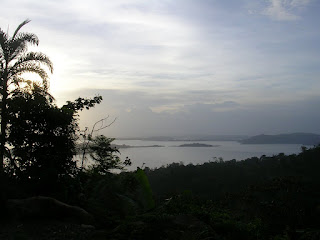
So I have been in my community for a month now. Little by little I have been getting to know the community. I visit peoples houses and introduce myself to those that I havnt met yet. I try and remember all of the names. I have been learning so much about the community, so I think that it is time that I share a little bit with all of you back home about these people and the community (and here is a photo of the view!). I work in a community located in the Province of Bocas del Toro. In this community live approximately 500 idigenous peoples from the large indigenous group called Ngabe. This group previously live in an area south of here up a big river. About 30 to 50 years ago (maybe more, quite difficult to get dates from some of the older people in my community who have a very different sense of time and dont subscribe to keeping track of years such as how old you are or when an event happened) people started to migrate out to this region to work in the banana company as well as to work on cacao farms own by the afro antillians. They then began to stake out land, which at that point as long a it was unoccupied, it was free to move onto and plant on. And from there communities began forming. There is one very little old man here who was the founder of this community and then his family came and then friends came and so on and so on. These people traditionally speak their own language, Ngabere, which is an oral language and has only been written down in the past 20 years or so. Now, most people speak both spanish and Ngabere, although there are older community members who only speak ngabere and some children in the community who have not learned to speak their indiginous language and only speak spanish. Every family has land where they commonly have cacao, mango, banana, platano, lime, and root vegetables planted. Most families have chickens and ducks. Today, the majority of the diet here consists of rice and boiled green bananas and chicken, although in the past most of the food was that which was collected from the wild, including some delicious fruits and vegetables. People still make traditional food and it varies from family to family. The men work in the farms maintaining and harvesting fruits, vegetables, cacao and wood to sell, while the women split their time between harvesting and cooking. Both the women and men here are very strong. Women in my community tell me that in the past, the women worked harder in the farms than they do today. Women also traditionally make beautiful bags out of a natural plant while the men weave hammocks. This community is a mix of the old traditional past and the new modern world. You may walk into a house made of wood with a thatched roof, raised on stilts and see the grandmother is weaving a bag and the kids are watching rambo 4 on a small television run on a car battery! It is a mix of everything. No electricity, sometimes the water comes from the aquaduct and when it doesnt you either walk to a little stream nearby or you wait for the rain to fill your buckets!
So there is a little description of what life is like here. And now I am off to practice to play in a volleyball tournament with my community this saturday!
A great little thing that happens in my community, the people love to ask me to sing in english, so I sing my heart out, and it doesnt even matter if I remember the words because no one understands anyways! I just make them up! Quite entertaining! They really like to hear the " Jeremiah was a bullfrog" song!



2 comments:
might I suggest you sing "like a prayer" and/or "i will survive"? i suppose both really go without saying... :)
i sang both at a karaoke night a few weeks ago, here in NC, and got quite a crew of followers joining in.
miss yoooou!
And any Beatles song would be good, I imagine. I love the image of you singing American rock songs around the village and everyone with huge smiles upon hearing you! What an amazing experience you are having. Rock on!
Post a Comment